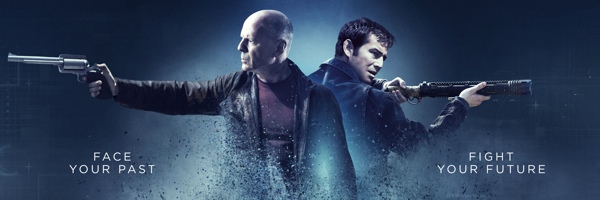“Looper” is so heavy; so violent; but still, so surprising and unique that a day after we saw it, I’m still not sure how I feel about it.
It stars Bruce Willis and Joseph Gordon-Levitt as an older and younger version, respectively, of the same character, an assassin in the midwest of the future.
One might wonder how the two actors approached this. I wondered when I first read about the film if Gordon-Levitt would be playing Bruce Willis, or the other way around, or if the two found some middle ground. Bruce Willis is playing the character he always plays, and it’s up to Gordon-Levitt to do an impersonation of Willis, which he does, very skillfully. I could have believed that Gordon-Levitt was the same person, simply through his acting.
Unfortunately, someone involved didn’t think that would be adequate and through the magic of prosthetics, attempted to transform him into Willis. Even with Gordon-Levitt’s ridiculous makeup, they look nothing alike, and indeed, he looks like a waxy robot.
A lot of small moments throughout this film felt so familiar. I felt as if I’d seen something before with a similar premise, or similar scenes, or something I couldn’t quite put my finger on. There were characters dressed like Neo; the time-travel element of the film recalled for me “Twelve Monkeys,” and we see a glimpse of Butch Coolidge, Willis’ character in “Pulp Fiction.” I felt like I was watching a Christopher Nolan film at times and Johnson seems to love lens flare as much as J.J. Abrams. This film is many pieces of cinema cobbled together into something that’s big and loud enough to bring in mainstream audiences.
My favorite performance in this film might be that of a child. He is so good, in fact, that I was convinced he was some sort of CG creation. He reminded me of the child actress in the film “The Fall.” The young boy’s story slowly, stealthily, becomes the focus of the story late in the film. The introduction of this storyline is a radical departure in tone from what I was expecting. In fact, it almost cut the film into two separate movies, in my view.
The score for the film was composed by Nathan Johnson. It’s effective, meaning that it’s noticeable at just the right times and never too loud or melodramatic. The cue that plays just before the credits roll is lovely and frames the ending of the film in a pleasantly unexpected way.
New Orleans and its suburbs stand in for Kansas, and I don’t know why it’s important that we believe the film takes place in Kansas. It just seems like a strange choice. The plot doesn’t hinge on us thinking we’re in Kansas. There is a certain suspension of disbelief necessary in watching sci-fi films. Isn’t it easier for the filmmaker to just suggest we’re in some unnamed Other Place, where time travel/aliens/spaceships are possible?
I will certainly benefit from a second viewing. “Looper” is a multi-layered, intelligent film that I think will spark discussion for some time to come.
